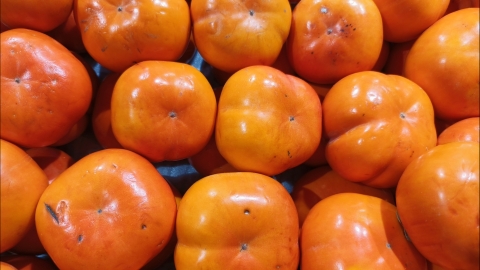What should not be eaten with persimmons?
Generally, persimmons should not be consumed with high-protein foods, sweet potatoes, spinach, vinegar, or alcohol. Detailed explanations are as follows:

1. High-protein foods
High-protein foods such as crabs, shrimp, fish, and chicken may combine with components like tannins and pectin in persimmons, easily forming coagulated substances that are difficult to digest. These substances may remain in the stomach for a long time and potentially cause abdominal pain, vomiting, diarrhea, and other symptoms.
2. Sweet potatoes
Sweet potatoes contain large amounts of starch, which may stimulate gastric acid secretion after consumption. The tannins and pectin in persimmons may combine with gastric acid to form precipitates that are difficult to digest, thus affecting the digestive and absorptive functions of the gastrointestinal tract.
3. Spinach
Spinach contains high levels of oxalic acid. When combined with tannins from persimmons, it may easily form stones (calculi), thereby increasing the risk of developing stone-related diseases.
4. Vinegar
Persimmons contain substances such as persimmon gum, which may combine with acetic acid in vinegar to form clumps. These clumps may remain in the stomach, thus affecting the normal function of the gastrointestinal tract.
5. Alcohol
Under the influence of alcohol, tannins in persimmons may combine with food residue and mucus in the stomach to form persimmon stones, which may cause intestinal blockage and lead to conditions such as intestinal obstruction.
In daily life, one should avoid consuming persimmons together with the above-mentioned foods. It is recommended to pay attention to proper food pairing when eating persimmons. Additionally, excessive consumption should be avoided; persimmons should be consumed in appropriate quantities according to individual constitution and health conditions. If discomfort occurs, timely medical attention should be sought.





